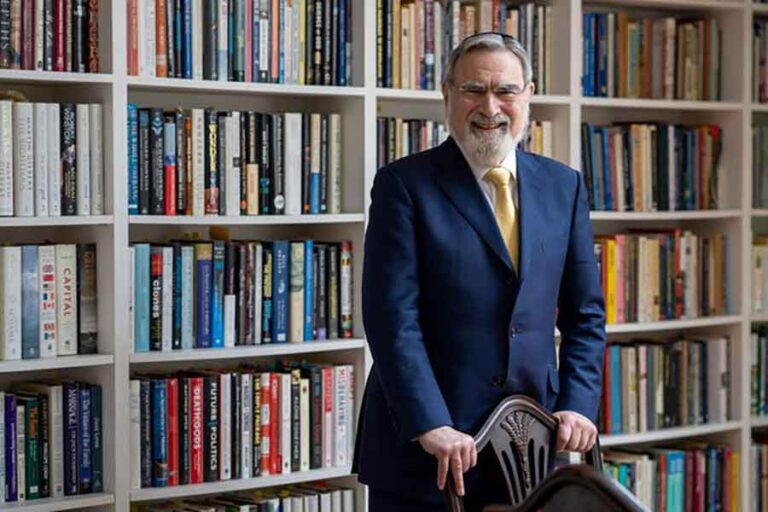Isaac stays in the land, never leaves it, never undertakes a journey in the sense of going somewhere new. He is the quintessential yoshev ohel, âdweller in tents,â inner-directed, introspective, focused on his own spiritual growth rather than the outside world. He is passive, a mystic, a man of feeling rather than action. He is the one who prays in the field, who meditates alone, who does not confront the challenges of the world outside. He is the near-sacrifice, the one who has to be saved by G-d. He is what we might call âfaith as submission.â
Jacob is different. He is the man of tents and journeys, the dweller in the tents of study who is always on the move. He is the man who dreams dreams of angels ascending and descending, the man who wrestles with an angel, the man who struggles with his brother, his wives, his father-in-law, his children. He is the man who goes down to Egypt and returns to the land. He is the man who, in the words of the Midrash, builds a ladder from earth to heaven.
What Jacob teaches us is that faith is not just submission, not just introspection, but struggle, growth, conflict, tension. Faith is the refusal to be satisfied with the status quo. It is the refusal to accept that the world is as it is and cannot be changed. It is the refusal to see oneself as a victim, as someone elseâs creature. It is the courage to challenge, to argue, to fight for what one believes.
Jacob is the man who, in the words of Yeats, âcast a cold eye on life, on death.â He is the man who struggles with G-d and with man and prevails. He is the man who becomes Israel, the one who wrestles with G-d and with men and wins. He is the man who understands that faith is not passive but active, not accepting but challenging, not resigned but striving. That is why he is our father, the hero of our faith, the one in whose name we are called âthe children of Israel.â
So we are âthe congregation of Jacob,â because Jacob is the one who teaches us that to be a Jew is to be on a journey, a journey of the soul, a journey of faith, a journey of growth, a journey of struggle, a journey of hope. That is why Jacob is the father of our people, the hero of our faith.
May his memory be for a blessing.
He makes sure that Isaac does not leave the Holy Land (see Genesis 24:6 – that is why Abraham does not let him travel to find a wife). Isaac’s one journey (to the land of the Philistines, in Genesis 26) is limited and local. Isaac’s life is a brief respite from the nomadic existence Abraham and Jacob both experience.
Jacob is different again. What makes him unique is that he has his most intense encounters with G-d – they are the most dramatic in the whole book of Genesis – in the midst of the journey, alone, at night, far from home, fleeing from one danger to the next, from Eisav to Lavan on the outward journey, from Lavan to Eisav on his homecoming.
In the midst of the first he has the blazing epiphany of the ladder stretching from earth to heaven, with angels ascending and descending, moving him to say on waking, “G-d is truly in this place, but I did not know it… This must be G-d’s house and this the gate to heaven” (Gen. 28:16-17). None of the other patriarchs, not even Moses, has a vision quite like this.
On the second, in our parsha, he has the haunting, enigmatic wrestling match with the man/angel/G-d, which leaves him limping but permanently transformed – the only person in the Torah to receive from G-d an entirely new name, Israel, which may mean, “one who has wrestled with G-d and man” or “one who has become a prince [sar] before G-d.”
What is fascinating is that Jacob’s meetings with angels are described by the same verb – ‘p-g-‘a, (Gen. 28:11, and Gen. 32:2) which means “a chance encounter,” as if they took Jacob by surprise, which they clearly did. Jacob’s most spiritual moments are ones he did not plan. He was thinking of other things, about what he was leaving behind and what lay ahead of him. He was, as it were, “surprised by G-d.”
Jacob is someone with whom we can identify. Not everyone can aspire to the loving faith and total trust of an Abraham, or to the seclusion of an Isaac. But Jacob is someone we understand. We can feel his fear, understand his pain at the tensions in his family, and sympathize with his deep longing for a life of quietude and peace (the Sages say about the opening words of next week’s parsha that “Jacob longed to live at peace, but was immediately thrust into the troubles of Joseph”).
The point is not just that Jacob is the most human of the patriarchs but rather that at the depths of his despair he is lifted to the greatest heights of spirituality. He is the man who encounters angels. He is the person surprised by G-d. He is the one who, at the very moments he feels most alone, discovers that he is not alone, that G-d is with him, that he is accompanied by angels.
Jacob’s message defines Jewish existence. It is our destiny to travel. We are the restless people. Rare and brief have been our interludes of peace. But in the dark of night, we have found ourselves lifted by a force of faith we did not know we had, surrounded by angels we did not know were there. If we walk in the way of Jacob, we too may find ourselves surprised by G-d.

